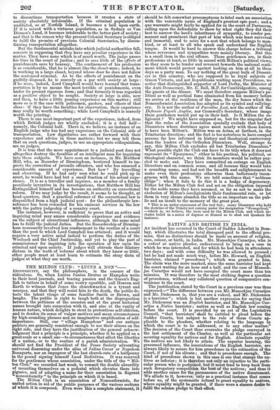NATIVE AND BRITISH IN INDIA.
Ax incident has occurred in the Court of Sadder Adawlut in Bom- bay, which illustrates the total disregard paid to the official pro- mise, that no distinctions should be made on account of religion, race, colour, or birth, in India. Mr. Manookjee Cursetjee, who is a valwel or native pleader, endeavoured to bring on a case in which he was interested, and for which he had been in attendance two days ; and with some difficulty he was allowed to proceed ; but he had not made much way, before Mr. Howard, an rtnglish barrister, claimed " precedence "; which was granted to him. The claim was the more marked, since the same barrister had kept the court waiting for an hour and a half, and the case of .Manook- jee Cursetjee would not have occupied the court more than ten minutes. It was therefore in the most striking degree a question of precedence, without any collateral question of comparative con- venience to the court The justification stated by the Court in a previous ease was thus expressed—" The difference between you Mr. Manockjee Carsetjee and Mr. Dickenson is, that you are a vakeel, and Mr. Dickenson is a barrister"; which is but another expression for saying that Mr. Dickenson was an English barrister, and Mr. Ifanockjee Cur- setjee a Native barrister ; native as well as Rnglish law coming before the court. It is provided by an act of the Legislative Council, "that barristers shall be entitled to plead before the Sadder Courts, but subject to the rule of those Courts ap- plicable to the pleaders, whether relating to the language in which the court is to be addressed, or to any other matter." The decision of the Court thus overrules the pledge conveyed in the last settlement of the Charter, as well as the particular act securing equality for natives and for English. Absolute equality the natives are not likely to attain. The superior learning, the presumed influence, the associations of the English barrister, are always lady to secure for him precedence in the estimation of the Court, if not of his clients ; and that is precedence enough. The kind of precedence shown in this case is one that stamps the na- tives as inferior; it is therefore not only an injustice to the parti- cular person who is postponed, but it must tend to keep back from such derogatory competition the best of the natives ; and thus it adds another cause for the permanence of the native disratement. We allude to it, however, only as a practical instance that comes before us, of the systematic refusal to grant equality to natives, where equality might be granted, if there were a sincere desire to fulfil the solemn pledge to that effect.


























 Previous page
Previous page